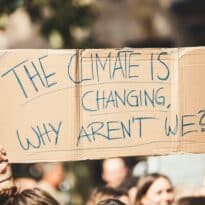Sustainable investment approaches must adapt to keep pace with growing global needs, says Ninety One.
Annual climate finance needs to increase almost six fold to limit global warming to 1.5 degrees Celsius, according to the Climate Policy Initiative, but crucially this capital needs to go to the right places. At present, around 80% of the world’s financial assets are located in developed markets, but at least 70% of the investment required to achieve the Paris Agreement climate targets and the UN’s Sustainable Development Goals must be directed towards emerging markets, says the global investment manager.
According to Ninety One, the dynamic is unlikely to change with today’s sustainable investment approaches, many of which are focused on providing companies with an ESG score and dividing them into good and bad for portfolio inclusion. Often, this results in emerging market companies being excluded.
Deirdre Cooper, co-head of thematic equities and co portfolio manager, Global Environment, at Ninety One, says: “Firstly, this gives no consideration to a company’s willingness or ability to drive sustainable development where it is desperately needed, including with respect to climate solutions, financial inclusion, physical and digital infrastructure, healthcare and education.
“Secondly, it ignores emerging companies’ potential to deliver growth and profits for the benefit of shareholders. Many in the West fail to appreciate that being a leader in sustainability can be a growth tailwind for these businesses, too.
“Therefore, the first item on the to-do list is to evolve today’s simplistic and backwards-looking sustainability assessments into more intelligent, contextualised appraisals. This way, the babies will not be thrown out with the bathwater and emerging markets will be properly represented in sustainable portfolios.”
“The first item on the to-do list is to evolve today’s simplistic and backwards-looking sustainability assessments into more intelligent, contextualised appraisals.”
Ninety One says investors must adapt the way they invest to reflect changes in the business world. The traditional way of thinking about shareholder returns is evolving, with consumers, society and markets starting to reward companies that consider the impact they have on all stakeholders.
Cooper explains: “This trend towards the internalisation of corporate externalities is happening to a far greater extent than many people seem to realise. To get ahead of this shift in how the world appraises companies, investment managers are likely to have to expand the skillsets and cognitive diversity of their teams. If the companies of tomorrow succeed because they act and think differently to their predecessors, it seems a fair bet that the successful investment teams of the future will look and behave differently to those of today.”
Ninety One has also called for more sophisticated assessments, noting there is a scarcity of metrics and methodologies to enable portfolio managers to calculate the value of the environmental capital companies create or destroy through externalities that impact biodiversity, land, water and air quality.
Stephanie Niven, portfolio manager global sustainable equity at Ninety One said: “These often cited diversity metrics offer a neat illustration of where sustainable investing is today, and where it needs to get to. By itself, diversity will not make a company more innovative and responsive to customers’ needs. These drivers of growth will only be unlocked if the company is run in a way that enables people from all walks of life to contribute and exert influence. Analysts and portfolio managers need to appraise not only a company’s diversity, but its inclusiveness. This is a more complicated, qualitative assessment that requires in-depth, direct knowledge of a company.”
Ninety One believes portfolio managers and analysts should fully incorporate these new methodologies for valuing externalities into their analysis rather than relying on external ESG ratings and other outsourced sustainability insights.






























